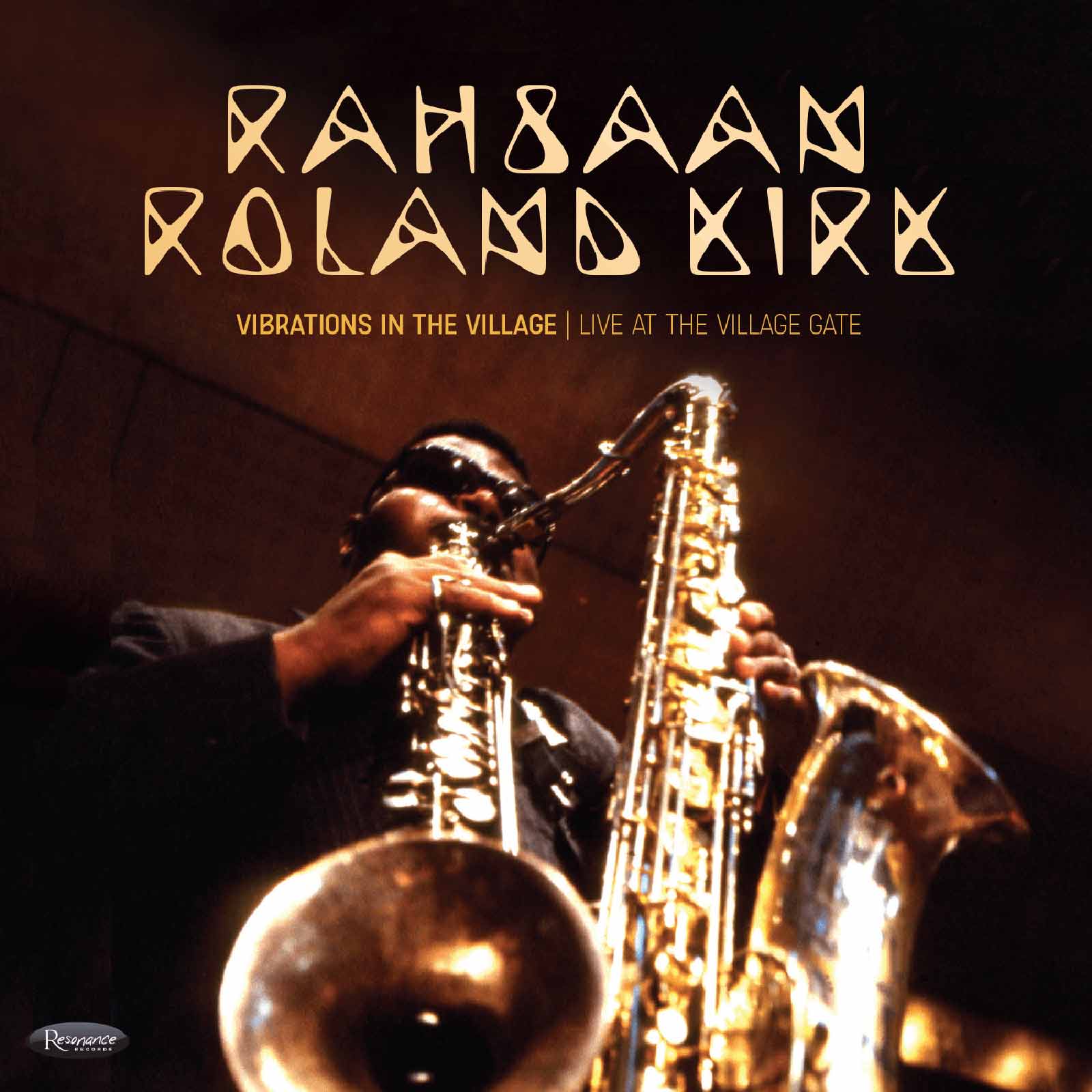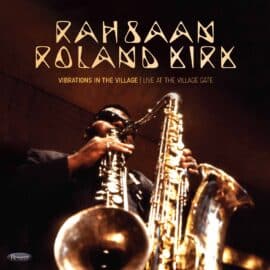| Jazz |

Rahsaan Roland Kirk: The Uncompromising Genius Who Redefined Jazz
The Village Gate, late November 1963. Smoke curls above the heads of the crowd, the clinking of glasses fades as the lights dim, and the unmistakable hum of anticipation fills the room. On stage, Rahsaan Roland Kirk prepares to play, surrounded by instruments, flutes, and reeds that seem to orbit him like satellites around a gravitational force. Those who came to the Gate that night would not have realized they were witnessing something that would remain unheard by the public for more than sixty years.
This newly unearthed live recording, captured at the Village Gate on November 26 and 27, 1963, is more than a rediscovered document; it is a revelation. Featuring pianists Horace Parlan, Melvin Rhyne, and Jane Getz, with bassist Henry Grimes and drummer Sonny Brown, the sessions were originally intended for a documentary film that was never completed. The tapes disappeared into storage, surviving the decades until their restoration and remastering by Matthew Lutthans at The Mastering Lab. Now, after 62 years, the sound has been revived, with all its raw edges, warmth, and vitality intact.
The deluxe edition of the release is accompanied by a richly illustrated booklet, featuring rare photographs by Jan Persson, Tom Copi, Raymond Ross, and others. Newly commissioned liner notes by John Kruth and May Cobb trace Kirk’s restless inventiveness, while fresh interviews — from Jane Getz, James Carter, Chico Freeman, Steve Turre, and Adam Dorn (son of longtime Kirk supporter Joel Dorn), provide both affection and astonishment. Their recollections confirm what many musicians have long known: Rahsaan Roland Kirk was not just a player; he was a force of nature.
A Sound from Another Time, and Yet, Still Ahead of Ours
The recording itself bears all the hallmarks of its era. In the early 1960s, live recording techniques were designed primarily for shortwave radio broadcast or vinyl playback. The resulting sound feels unmistakably “of its time”, narrow, close, a touch brittle. Yet that very quality lends the album a rare authenticity. The crackle of the air, the crowd’s murmurs, the slightly imperfect acoustics, all combine to produce a nostalgia that feels tactile.
This is not just a time capsule, though. Beneath the patina of vintage sound lies something timeless: the confidence and craftsmanship of musicians at the height of their creative power. The early 1960s were a moment of transition in American jazz. The civil rights movement was reshaping the cultural landscape. Miles Davis was moving toward modal exploration, John Coltrane toward spiritual transcendence. The rhythms of Africa, the Caribbean, and Latin America were filtering into the mainstream. Within that ferment, Rahsaan Roland Kirk was building a language entirely his own, one that anticipated the polyphonic, global, and fearless jazz that would dominate the next decades.
Beyond Hard Bop
To call Kirk a hard bop musician is to miss the point. Labels never sat comfortably on his shoulders, and he treated them with the same irreverence with which he treated musical boundaries. His art absorbed the full range of what he once called “Black classical music”, blues, gospel, rhythm and blues, free improvisation, and the avant-garde.
On this Village Gate session, the listener can hear the threads of those influences intertwine. The phrasing is steeped in tradition, but the ideas, abrupt shifts in rhythm, circular breathing, simultaneous melodies played on multiple horns, point toward an uncharted future. Close your eyes, strip away the surface noise, and the sound could easily belong to today, or even tomorrow.
Rahsaan Roland Kirk was also a revolutionary flutist and clarinetist. He adapted the vocal expressiveness of scat singing to the flute, creating an almost percussive, human-like articulation that was unheard of at the time. It was not just a technique; it was a philosophy of sound, a refusal to separate voice from instrument, breath from music. Listening now, one senses that Kirk may have invented, or at least prefigured, what would later be called jazz fusion: the seamless blending of acoustic and electric, spiritual and sensual, past and future.
A Reluctant Competitor, an Uncompromising Artist
Among his contemporaries, Kirk was both revered and feared. Many found his genius overwhelming, and his personality, uncompromising. He could not tolerate competition, not because he felt insecure, but because he believed music was not a contest. It was an act of communion, a shared vibration between performer and audience. To play music, for Kirk, was to serve something larger than ego, even though his own ego, like his talent, was monumental.
This contradiction, the tension between self and service, lies at the heart of his artistry. He was, in a sense, the bridge between two eras: the disciplined, hard-swinging craft of post-bop and the open-ended, boundary-shattering freedom of the 1970s. Listening to this recording, one hears that bridge being built in real time, plank by plank, solo by solo.
A Rediscovery That Feels Like Prophecy
Rahsaan Roland Kirk died in 1977, at just 42. By then, jazz was already fracturing into fusion, funk, and the avant-garde. Yet in his short life, he had already mapped out the possibilities that others would explore for decades to come. That’s what makes this rediscovery feel less like a return to the past and more like a prophecy fulfilled.
The Village Gate tapes remind us that history often hides its most daring voices in plain sight, waiting for the right moment to be heard again. The album’s imperfections, the hiss of old magnetic tape, the uneven levels of live recording, only enhance its authenticity. What emerges through the static is a voice of boundless imagination, a man who could make a single breath sound like an orchestra.
The Past Sounds Like the Future
In the end, this album is not just an archival release or a nostalgic curiosity. It is a living lesson in musical courage. It asks listeners, old and new alike, to reconsider what “modern” really means.
Because when you hear Rahsaan Roland Kirk play, when you feel the urgency of his improvisations, the wit of his phrasing, the spiritual ferocity of his tone, you realize that innovation is not a matter of technology or time. It is a matter of vision. And vision, unlike sound, never ages.
As one of the musicians interviewed for this release put it, “Rahsaan didn’t play for the moment. He played for eternity.”
And, listening now, we can finally hear what eternity sounds like.
Thierry De Clemensat
Member at Jazz Journalists Association
USA correspondent for Paris-Move and ABS magazine
Editor in chief – Bayou Blue Radio, Bayou Blue News
PARIS-MOVE, November 7th 2025
Follow PARIS-MOVE on X
::::::::::::::::::::::::
Musicians :
Rahsaan Roland Kirk – tenor saxophone, stritch, manzello, flute, vocals, whistle, etc.
Horace Parlan – piano
Melvin Rhyne – piano
Jane Getz – piano
Henry Grimes – bass
Sonny Brown – drums
Track Listing :
Jump Up And Down – Fast (15:34)
Ecclusiastics (5:52)
All the Things You Are (7:33)
Laura (7:43)
Kirk’s Delight (12:37)
Oboe Blues (10:20)
Blues Minor at the Gate (6:28)
Falling In Love With Love (5:44)
Three For the Festival (6:09)

